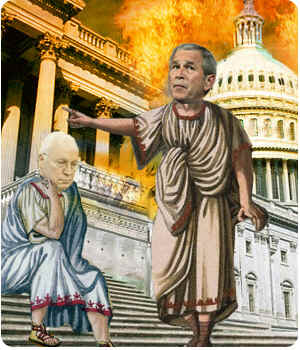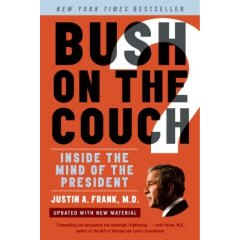|
Greenspan: "I am saddened that it is politically inconvenient
to acknowledge
what everyone knows: the Iraq war is
largely about oil."
The Age of
Turbulence: Adventures in a New World

Hubris and Nemesis:
"The experience of the Cold War gives Americans
a sense that they can run the
world because their military power is so much greater than
that of any other nation
or group of nations. But the nation's economic base is
smaller than ever, so resources
do not support expectations." ( http://catch-13.blogspot.com/2006/04/american-hubris.htm
l
The dollar cost, so far, of the Iraq war is nearly $500 billion!
American unity and resolve
are shattered. And the dollar is in a major
decline. The FED's Rate Cut tomorrow will
make the Dollar even less attractive.

Wars have always bred greed
and arrogance. It was true in Socrates and Plato's day.
Socrates condemned repeatedly the best known Greek political
leaders of ancient
Athens: Themistocles, Cimon and Militiades. These men were
the architects of the battles
of Marathon and Salamis that repelled the much bigger invading
Persian forces of Darius and
Xerxes. But Socrates condemned them and also Pericles, the builder
of the Acropolis.
He condemned a new imperialism he saw in Athens, a confidence and
ambition that lets
Athens' leaders believe it was their destiny and duty
to conquer all of Greece. It was the
Athenian navy, built first to protect against the
Persians, that Pericles tried to use to
control all of Greece. In the end the Athenians
suffered a disastrous defeat at the hands
of Sparta. (See Peloponnesian War, 431-404 BC)
Aristotle defined hubris as causing shame to the
victim, merely for self-
gratification. Hubris is not reprisal for past injuries. "As for
the pleasure in
hubris, its cause is this: men think that by ill-treating others they make their own
superiority the greater."
Themistocles may have built the Athenian Navy
that defeated the Persian fleet, but
Socrates charged him with greed, fraud and vanity. for he
had even built a public shrine to
himself on grounds that his own counsel was the wisest.
Athenian cruelty grew. too,
after the defeat of the Persians. For example, the
people living in the island of Melos
refused to surrender to Athens. They wished to remain
neutral in the Peloponnesian War.
So, the Athenians starved them into submission. The
men were all executed. The
women and children became slaves. The principles of
POWER and GREED ruled
in Athens now. The old virtue of temperance was scorned.
In this way, Perciles sowed the
seeds of Athen's own disaster.
Arrogance was the greatest sin, according
to Thucydides, the great historian
of the Peloponnesian War. Unbridled greed and hubris
always produced a tragic end
in the classical Greek tragedy. To them
Hubris was an overbearing pride and resulted
in fatal retribtion. It was a character flaw that
brought on their "nemesis", or destruction.

"I am the Decider and I decide what's best."
I haven't read, but may soon get
Bush on the Couch
Rev Ed: Inside the Mind of the President .
(Paperback) by Justin
A. Frank 
Book Description
With the Bush administration in permanent crisis, a renowned Washington psychoanalyst
updates his portrait of George
W.'s public persona—and how it has damaged the presidency.
Insightful and accessible, courageous and controversial, Bush on the Couch
sheds startling new light on George W. Bush's
psyche and its impact on the way he governs, tackling head-on the question few seem
willing to ask: Is our president
psychologically fit to run the country? With an eye for the subtleties of human behavior
sharpened by thirty years of
clinical practice, Dr. Justin A. Frank traces the development of Bush's character from
childhood through his presidency,
identifying and analyzing his patterns of thought, action, and communication. The result
is a troubling portrait filled with
important revelations about our nation's leader—including disturbing new insights
into:
- How Bush reacted to the 2006 Democratic sweep in Congress with a new surge of troops
into Iraq
- His telling habits and coping strategies—from his persistent mangling of English to
his tendency to "go blank" in the midst of crisis
- The tearful public breakdown of his father, George H. W. Bush, and what it says about
the former president's
relationship to his prominent sons
- The debacle of Katrina—the moment when Bush's arrogance finally failed him
With a new introduction and afterword, Bush on the Couch offers the most
thorough and candid portrait to date of
arguably the most psychologically damaged president since Nixon.
About the Author
Justin A. Frank, M.D., is a clinical professor in the Department of Psychiatry at
George Washington University
Medical Center. Since 1980 he has been a teaching analyst at the Washington Psychoanalytic
Institute. He is past
president of the Greater Washington Chapter of Physicians for Social Responsibility. Dr.
Frank lives and practices psychoanalysis in Washington, D.C.
|

